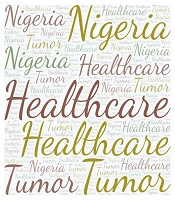Dear Editor,
Brain cancer is a major global health concern, affecting people of all ages and regions (1, 2). In recent years, Nigeria has seen a worrying increase in brain cancer cases, underscoring the need for greater awareness, research, and action (3, 4). This article explores the factors contributing to this rise in brain cancer cases in Nigeria. Brain cancer involves the abnormal growth of cells within the brain, leading to the formation of tumors. These tumors can be either cancerous (malignant) or non-cancerous (benign), with malignant tumors posing a more significant threat to health (5). Symptoms of brain cancer may include headaches, seizures, cognitive impairments, and neurological deficits (5). Although precise statistics on brain cancer incidence in Nigeria are not readily available, anecdotal evidence and reports from healthcare professionals suggest a noticeable increase in cases. This growing burden of brain cancer places significant strain on affected individuals, families, and the healthcare system, requiring urgent attention (6).
Many factors contribute to the rise of brain cancer in Nigeria. Several environmental factors may play a role in the increase of brain cancer cases in the country (7). These factors include exposure to hazardous chemicals, industrial pollutants, and agricultural pesticides. The unregulated use of these substances and poor waste management practices may lead to the accumulation of toxic substances in the environment, ultimately affecting human health (8, 9). Genetic factors can also influence an individual's susceptibility to various types of cancer, including brain cancer. Specific genetic mutations and inherited conditions increase the risk of developing brain tumors (10). In Nigeria, limited access to genetic testing and counseling services may result in undiagnosed genetic predispositions, preventing individuals from taking necessary preventive measures (11).
Nigeria faces numerous socioeconomic challenges that can indirectly contribute to the rise of brain cancer. Limited access to healthcare services, inadequate medical facilities, and a lack of awareness about early detection and treatment can delay diagnosis and hinder timely intervention. Poverty, malnutrition, and limited education can also lead to a lack of understanding regarding risk factors and preventive measures (12). Certain lifestyle and behavioral choices can influence the risk of developing cancer, including brain cancer. Factors such as tobacco and alcohol use, sedentary lifestyles, unhealthy diets, and exposure to ionizing radiation may contribute to the rise of brain cancer cases. Efforts to promote healthier lifestyles and raise awareness about the dangers of these risk factors can play a crucial role in reducing the incidence of brain cancer (13, 14).
The increasing incidence of brain cancer in Nigeria has profound implications for public health, requiring a multifaceted approach to address the issue effectively. Some key strategies to help combat this rising trend include: Firstly, government bodies, healthcare organizations, and NGOs should collaborate to raise public awareness about brain cancer, its risk factors, symptoms, and the importance of early detection and treatment (3). Secondly, investing in healthcare infrastructure, including establishing specialized cancer centers equipped with advanced diagnostic and treatment facilities, is crucial to ensure timely and effective management of brain cancer cases (15-17). Thirdly, promoting healthier lifestyles, discouraging tobacco and alcohol use, and implementing measures to minimize exposure to environmental toxins and radiation can significantly reduce the risk of brain cancer (18). Finally, increased research efforts and surveillance programs are essential to understand the causes, patterns, and trends of brain cancer in Nigeria. This knowledge will aid in developing targeted interventions and treatment protocols.
The rise in brain cancer cases in Nigeria calls for immediate attention and concerted efforts from government bodies, healthcare professionals, and society. By addressing the underlying causes and implementing preventive measures, Nigeria can mitigate the burden of brain cancer, improve healthcare outcomes, and ensure a healthier future for its population.
